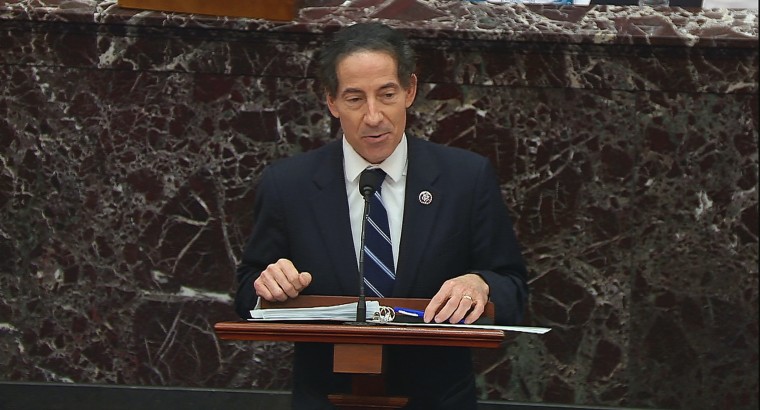For many of Donald Trump's critics, last week's impeachment trial was about more than simply holding former president accountable for inciting an insurrectionist riot. It was also about the vote that could've soon followed the trial.
If Trump had been convicted, Congress could've proceeded with a measure to ban Trump from ever again holding public office. That, obviously, is no longer an option.
But if there were another way? Rep. Jamie Raskin (D-Md.), a former constitutional law professor who led the team of House impeachment managers in last week's trial, talked to ABC News this week about Section 3 of the 14th Amendment being used to block Trump from running again.
Section 3 of the 14th Amendment bars any public official who swore an oath to protect the Constitution from holding office if they "engaged in insurrection or rebellion" against it or gave "aid or comfort to the enemies thereof."
The constitutional language, of course, was in response to the Civil War. The point at the time was to bar those who threatened our democracy and took up arms against the United States -- and their allies -- from trying to return to elected politics.
The provision hasn't been especially relevant in recent years, but it's hardly a stretch to think it could be applied to Trump.
Raskin told ABC News' Rick Klein that if Trump again sought elected office, there could be a variety of efforts -- in state legislators, in the courts -- to use Section 3 of the 14th Amendment to conclude that the former president is ineligible.
"[W]e'd have to figure it out and do some more research about all of that, but the point is that the constitutional purpose is clear, to keep people exactly like Donald Trump and other traitors to the union from holding public office," the Maryland Democrat added.
Raskin isn't the only one thinking along these lines. Earlier this week, former Republican Sen. John Danforth and former Republican Rep. Tom Coleman wrote a joint op-ed for the Washington Post arguing not only that Trump "engaged in insurrection within the meaning of Section 3," but also urging Congress to act accordingly.
Because the Senate failed to convict Trump in the impeachment trial, Congress should immediately take action to ensure that Trump is held accountable under Section 3 — an action endorsed by legal scholars. Ideally, Congress would enact legislation that both establishes judicial procedures to enforce Section 3 and expresses Congress's conclusion — based on factual findings — that Trump engaged in insurrection within the meaning of Section 3.
What's more, some have been pushing this approach for a while. Just a few days after the attack on the Capitol, before Trump even left the White House, Yale Law School's Bruce Ackerman and Indiana University law professor Gerard Magliocca wrote a related op-ed pointing to this "little-known constitutional provision" as a way to keep the Republican from seeking a second term.
All of which suggests that Trump's acquittal wasn't necessarily the end of the process, not just because the former president may yet face prosecution, but also because his opponents may yet have a legal recourse to stop him from again seeking an office of public trust.
Postscript: It's probably worth emphasizing that if Section 3 of the 14th Amendment could be used to block Trump, it might also be used against anti-election Republicans such as Sens. Ted Cruz and Josh Hawley.
